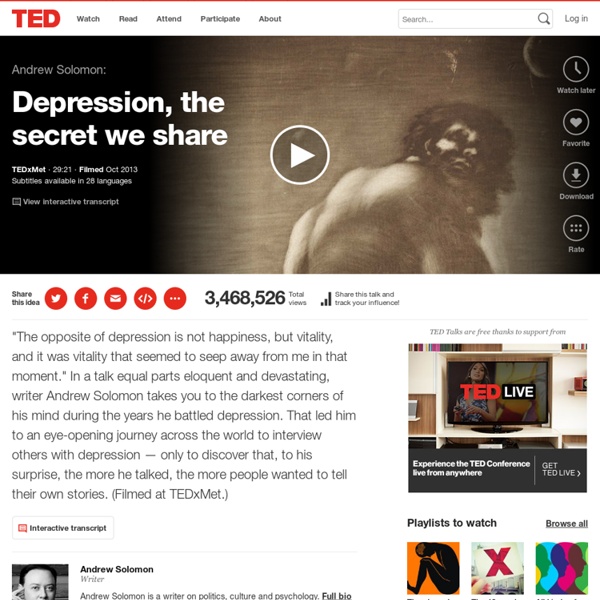Jack Green: GB hurdler on depression & the American dream
By Tom Reynolds BBC Sport "I am a runner. I have depression. I still believe I can be the best in the world."
Teenage depression - Family Lives
If your teenager is showing signs of depression, you may find yourself wondering whether it's 'just a phase' or something more serious. On average, three young people in every classroom are affected by mental health problems like depression. Many go undiagnosed and never get the help they need. Mental health problems cause more early deaths than either heart disease or cancer.
Tips for Keeping a Gratitude Journal
Psychology researchers aren’t necessarily Thanksgiving experts—they may not know how to make fluffy stuffing, say, or beat the traffic to your in-laws’ house—but they have become a fount of wisdom on thanksgiving (with a small “t”). Over the past decade, they’ve not only identified the great social, psychological, and physical health benefits that come from giving thanks; they’ve zeroed in on some concrete practices that help us reap those benefits. And perhaps the most popular practice is to keep a “gratitude journal.” As we’ve reported many times over the years, studies have traced a range of impressive benefits to the simple act of writing down the things for which we’re grateful—benefits including better sleep, fewer symptoms of illness, and more happiness among adults and kids alike. We’ve even launched our own digital gratitude journal, Thnx4.org, here on Greater Good.
What does depression feel like? Trust me – you really don’t want to know
This is Depression Awareness Week, so it must be hoped that during this seven-day period more people will become more aware of a condition that a minority experience, and which most others grasp only remotely – confusing it with more familiar feelings, such as unhappiness or misery. This perception is to some extent shared by the medical community, which can’t quite make its mind up whether depression is a physical “illness”, rooted in neurochemistry, or a negative habit of thought that can be addressed by talking or behavioural therapies. I’m not concerned about which of these two models is the more accurate. I’m still not sure myself.
7 ways to practice emotional first aid
You put a bandage on a cut or take antibiotics to treat an infection, right? No questions asked. In fact, questions would be asked if you didn’t apply first aid when necessary. So why isn’t the same true of our mental health? We are expected to just “get over” psychological wounds — when as anyone who’s ever ruminated over rejection or agonized over a failure knows only too well, emotional injuries can be just as crippling as physical ones. We need to learn how to practice emotional first aid.
How not to talk to someone with depression
Being depressed is really not enjoyable. Depression takes many forms for many different people – some people have highs and lows, some have major depression, some have functional days and others never do. Depression can involve a huge array of treatments including therapy, medication and experimental modalities. It can be permanent and intrusive, transitive. In all cases, depression is a monster, and depressed people often feel isolated and frustrated by what they’re experiencing.
When Maurice Shanahan needed help with his mental health, the GAA was there
Maurice Shanahan picked up a hurling All Star a couple of weekends ago, and by revealing his struggle on the evening of the event, he hoped to encourage others to seek help, just as he did, writes Michael Moynihan The lunchtime crowd was emptying out of the Dungarvan pub when a middle-aged couple broke away to approach two big men putting away BLTs in the corner. The couple shook hands with the two men and congratulated the younger one in particular.




Everything from Solomon should be watched. by robinmoisson Jul 19